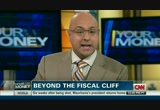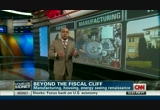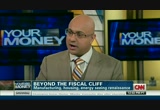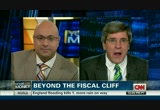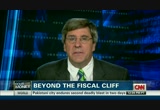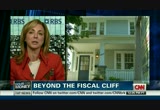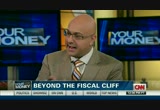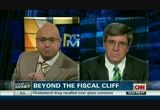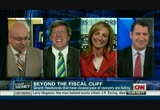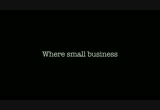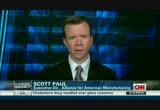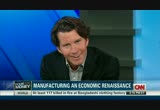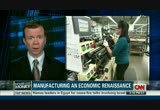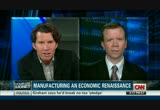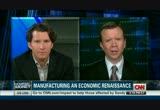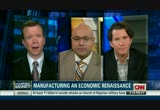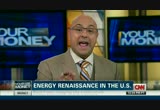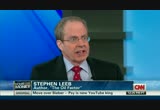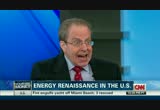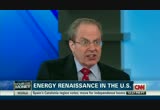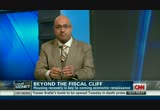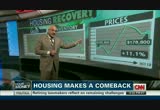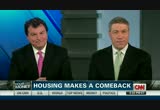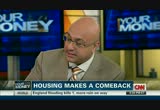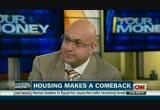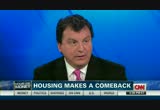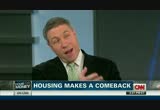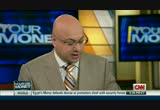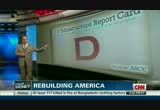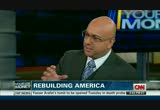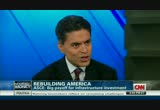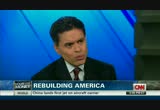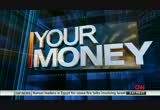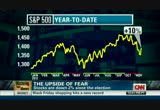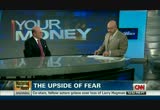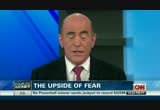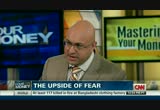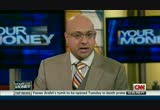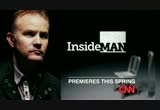tv Your Money CNN November 25, 2012 12:00pm-1:00pm PST
12:00 pm
hour. coming up, i will introduce you to shamus the beagle. he survived a bout with cancer and now he's helping his owner survive her own struggle with the disease. plus we'll show you some of the secret weapons north korean spies use. it's a cnn exclusive you don't want to miss. i'm fredricka whitfield. stay with cnn. "your money" starts right now. >> for months i've warned you about the economic storm, of the dangers of going over the so-called fiscal cliff, the one washington created. it seems with the noise of the campaign behind us, washington is listening, which means that after several months of harping on the dangers that you face, i am ready to make a big switch to telling you about the opportunities that lie ahead. i'm ali velshi and this is "your money." look, the clet of tthreat of th cliff remains real. i will not drop this subject until it's settled. but there is life after
12:01 pm
washington-induced catastrophe, and frankly, it looks like a pretty good life. if all goes according to plan, 2013 could be a big turnaround year for the u.s. the start of a recovery that feels real. most of it will have very little to do with washington policy, though your state and federal government will have to step in to make it happen. let me explain. first, there is an energy boom under way in the united states right now. fueled by the joint forces of hydraulic fracturing or fracking of natural gas out of shale and buy mo by more drilling for oil. natural gas is increasingly cheap and abundant and not only used for gas in homes and businesses but for the manufacturing generation. it's not just about cars and homes, more domestically pro du duced energy will provide fuel in manufacturing goods. combine them with rising costs
12:02 pm
in china and other countries and already high shipping costs, and you make made in america products more attractive to people abroad, and that's good. home sales rising for the first time in years. construction is start to go pick up. and historically low interest rates now averaging below 30% for a 30-year fixed mortgage will only fuel a rebound next year. and remember, a house will still be the most important asset for most americans, so a rebound there helps americans feel better about their financial situation and ready to spend a bit of money. stephen moore is a senior economics writer at the wall street journal as well as a member of its editor board. michelle is a senior economist at rbs and daniel gross is a columnist and business editor at "newsweek" daily beast. now we're likely to avert the
12:03 pm
worst of a fiscal cliff, unleash some of those spirits. we have things going on that will lead quite possibly to an economic rise, start bg now. am i wrong? >> i don't share your optimism about us not going over the fiscal cliff, but i also don't think it will matter. the coverage we've seen has been largely in spite of government, and energy, manufacturing, housing finally coming back. housing starts up 40% in october year after year. our exports are at our highest level ever. our goods and products have a big audience overseas. and the american consumer that was so down and out in '08 and '09 is back. consumer confidence, highest level since pre-recession. more people are working now at payroll jobs than at any time since january of 2009. their in connection with acomes. everybody is doing a better job
12:04 pm
at credit card debt, et cetera. it's a better shopping season. >> stephen moore, you and i don't share views on everything, we share the view on wanting america to be prosperous. we've been riding the same gloomy ride for a while. do you join my opinion that the renaissance is appealing? >> there's nothing more that i would like to see, and you are so right, there is so much right in america. you and i disagree pretty profoundly on a lot of policy issues, but when it comes to these industries you talk about, i'm right with you. i love the american energy story. we can be the saudi arabia of oil and natural gas production, and don't forget coal. we've got hundreds of years of that. we can -- and by the way, you're exactly right. because we now have access to cheap and abundant energy in this country, that has real peripheral effects with respect to manufacturing. i love the manufacturing story because our electricity and energy costs are now lower than the rest of the world.
12:05 pm
i agree with you on housing. we haven't built any housing in this country in five years. with these low interest rates, you could see a renaissance in housing continue. you and i agree on those things, but i do think policy matters, and it's not just solving the fiscal cliff, in my opinion, it's solving it in the right way. >> who are you and what have you done with stephen moore? stephen, hang on right now. susan, let me ask you, any recovery depends on american consumers. here's the interesting thing. american consumers have been telling us for months that contrary to lots of other economic evidence and indicators, things are looking and feeling better for them, and guess what, michelle, they have never, ever been wrong. every time the american consumer says we're going down, we go down. when they say things are getting better, they get better. they feel okay. >> and i think it gets back to just like you said, the housing turnaround. i think that's helped consumers feel much better about their own financial positions, and of course the fact that the equity
12:06 pm
markets through the summer, we're seeing a rebound, certainly not within the last month but prior to that. these things coming together, i think, could certainly bolster consumer confidence. although i will say in the end, so much of how the consumer will do is tied to jobs, and that's why you do get back to business, and that's why what stephen said is so important. how you resolve this fiscal cliff is incredibly important in terms of businesses not only having uncertainty removed but actually feeling like they'll be a better environment going forward. if that happens, then you can finally see more hiring and more investing, and ultimately that's what gets the economy going at a rate that we haven't yet enjoyed so far in this recovery. >> then, dan, are we feeling this way? you share the view that we are not -- we're not done with the fiscal cliff. we're not going to suddenly solve our fiscal problems. we certainly haven't been talking it up on the spending side. we've agreed -- we haven't
12:07 pm
agreed but there seems to be a movement toward the idea that some taxes will go up on the high end and the middle class won't see much of a tax increase. are we justified? >> i think the typical consumer is not like you and me and the other guests there. the typical consumer makes about $60,000 a year for their family. they're not getting tax dividends so they're not freaked up about those going up. they're concerned about their paychecks and paychecks have been more steady for the first time in several years, wages have gone up a little bit, and the biggest asset people own is a house. it's not just a volume of sales rising and construction but home values. and so with every passing week, a certain number of people who are under water on their mortgages are now in positive territory. and that contributes to what we call the wealth effect, people feeling more confident, they're more likely to spend. it's pro-cyclical. when things are going in the right direction, it forces to propel them further in the right direction. >> stephen, you feel very
12:08 pm
strongly tax rates should go down and not up. these pro-cyclical things, the idea that the price of your house might go up. if you're stuck with your house and you might be able to sell it, credit it with it being a little easier. obviously you're more interested in the paycheck than the houses you pay on the paycheck. do we see a little tax increase? i'm not asking you to give up your position. you will always be here arguing that taxes should be lower. but does it outweigh your ongoing concerns that taxes are going to krip pel us? >> yes, i think we can get through this and also if there's growth the tax rates won't be so high. i think michelle is right. it all starts with jobs. if people don't have jobs they can't pay mortgages, they can't buy anything. i want to stay on this optimistic theme, and maybe because it's thanksgiving weekend, but i made this point before on your show.
12:09 pm
when it comes to america relative to the rest of the world, we're the least rotten apple in the cards, right? that gives us a huge advantage in terms of investment, coming to the united states, building new business, and that's why i'm somewhat optimistic despite the fact i don't like the direction washington is heading. >> we were always the least rotten apple but it had a worm in it, and maybe this fiscal discussion will remove the worm. michelle, what do they have to do to not return the worm to the apple, to get this feeling that we are doing better? >> bottom line, i do believe we are talking about an economy, if we can do the right thing, to grow 2% and if we can get some longer term certainty in terms of a grand bargain and release the constraints in this economy that businesses face in terms of uncertainty, i think we could look at an economy that could grow better than trend in this
12:10 pm
economy. >> i look forward to it. i want to reach out and hug all of you. it's a useful time to at least point out the good things. we spend a lot of time pointing out the bad things. we'll continue doing that as necessary, however. dan gross, and michelle girard and stephen moore. thanks to all of you. coming up, we just touched on it, but global recession has chipped away at manufacturing jobs in the last decade. those jobs are coming back. don't forget to wear a tool belt to the manufacturing site, though. we'll look at the manufacturing jobs of the future when we come back. you are watching "your money." these smartphones come with a bonus $100 walmart gift card?
12:11 pm
that's right. so it's like i won. sure. oh my gosh i won!!! i won!!! [ male announcer ] get a $100 walmart gift card when you buy any android or windows 8 smartphone. through december 1st. from america's gift headquarters. walmart. throughout our lives. one a day men's 50+ is a complete multi-vitamin designed for men's health concerns as we age. it has more of 7 antioxidants to support cell health. one a day men's 50+. to support cell health. take the steps to reach yours, everyowith usgoals. with real advice, for real goals.
12:12 pm
the us bank wealth management advisor can help you. every step of the way. from big steps, to little steps. since 1863 we've helped guide our clients, so they can take the steps to help grow, preserve, and pass along their wealth. so their footsteps can help the next generation find their own path. all of us serving you. us bank of green giant vegetables it's easy to eat like a giant... ♪ and feel like a green giant. ♪ ho ho ho ♪ green giant can i still ship a gift in time for christmas? yeah, sure you can. great. where's your gift? uh... whew. [ male announcer ] break from the holiday stress. ship fedex express by december 22nd for christmas delivery.
12:13 pm
made in america, it's one of the keys to the american renaissance and it's the backbone to the middle class. or is it? the economy is adding jobs but the jobs the u.s. is adding are not the same ones it has lost. take a look at this, jobs in leisure and hospitality. one of the big growth areas in the last few years pay $13.35 an hour. retail pays more, $16.43 an hour, but neither of these pay as well as manufacturing with an average hourly rate of about $24
12:14 pm
an hour. since january of 2010, the u.s. economy has added 508,000 manufacturing jobs. that's since the gij of tbeginn the recession. that's a blip, by the way, compared to the last 25 years. since 1997, take a look at this. the u.s. has lost 5.5 million manufacturing jobs. but at the same time america's manufacturing output has increased by 84%. we've increased our output as we've employed substantially fewer people. technology, automation. scott paul is the director of american alliance manufacturing. my friend will cain, cnn contribute toror contributor. scott, we are producing more with less as an industry, but do manufacturing jobs look good? >> well, and that's the real question, ali. i do think there is a good future for manufacturing jobs in this country. no, we won't have factories that
12:15 pm
are employing 10,000, 20,000 people like we did in the heydays of the '50s or the '60s, but there is a lot of reason to believe we could invest in manufacturing that we could actually add jobs on and that it's a viable career path for young people today. we have an aging manufacturing work force. secondly, production costs are coming way down in the united states. you're seeing firms that are reshoring jobs, you're seeing lenovo open up a laptop manufacturing facility in north carolina. these are things you couldn't have imagined a decade ago. >> let me bring will into this conversation. will, listen carefully to this. president obama, as you know, during the campaign promised, and people said all sorts of things during campaigns, that he's going to create a million new manufacturing jobs at the end of his second term. he also wants to tax the rate on -- lower the tax rate on manufacturers, provide incent e incentives for companies that reshore or bring jobs back to the united states, and you say
12:16 pm
just the opposite of what scott just said. you say it's a policy that takes us back to the '50s. >> what you just put up on the screen, that's the fly in the ointment. we've seen a small renaissance in the last decade, and bravo. manufacturing needs special tax rates, incentives, tax subsidies, so forth. why does it need special treatment? >> scott? >> there is a good answer for that, and yes it does need special treatment. first of all, there is no sector in our economy that has a higher multiplier effect. when you create a job at a factory, you create spinoff jobs and logistics that the cash going to the economy creates jobs at the grocery store. the opposite is hardly ever true. second, we now know that manufacturing production in innovation are linked together. when those two are separated by an ocean, it doesn't work very well and that's what firms are discovering. in fact, some of the leading researchers at mit and harvard have included the same thing,
12:17 pm
that if you want to have innovation in an economy that's going full freight, you need to have production. and finally, let's not forget exports as well. >> we'll get to exports in a second. let me hold up an example, though. apple, you could make the argument, managed to innovate very effectively and manufacture everything an ocean away. >> they have a very risky manufacturing strategy that's depending on 250,000 workers in china that are working in deplorable conditions, as we know. there is a smarter way to do it, and yes, it would be highly automated, but they could be employing thousands of engineers in california making those products. it wouldn't raise the cost of an iphone more than a couple of bucks, but the returns for our economy would be fabulous. it would be great. >> here's the deal, scott. here's why i disagree with you, and that's if this those benefits all exist as you laid them out, the innovation to manufacturing need to be geographically linked in order to be fully op pi timized, won'e
12:18 pm
country itself figure that out? why do they need the government to step in and realize those goals? if it's there, it will be self-evident and the company will choose that path. >> manufacturing is in a tradeable sector. we have global competition. other sectors of the economy don't necessarily have that. manufacturers do, and every other country out there has incentives to attract manufacturing, whether it's the low road like china or the high road like germany. if we're not in that game, we're going to be sitting on the sidelines. we're going to lose jobs and we've seen that. our manufacturing goods trade deficit has gone up. >> that might be true that some play dirty, why don't we as well. the risk is we encourage malinvestment. all these things made unique and special in the last 100 years in the economy, and that's innovation, that's resilience. had little to do with subsidies, but rather a unique playing field. let's not corrupt what's made
12:19 pm
dirty to keep up with the dirty players. >> i'm not suggesting we play dirty, and i disagree with your economic history a little bit. every successful history that's been incubated in the united states has been in yonurtured. someone makes cars in the united states. i'd like to see them made here. china, germany, japan, they all have car manufacturing. i think it should be smart, i think it should be sophisticated, i think it should be based on incentives and what the private sector wants. you can control that manufacturing. that's why ford is bringing manufacturing of the fusion back to the united states. it's why gm is bringing back some of its functions from india to michigan. it's why you've seen lenovo bring laptop manufacturing from
12:20 pm
china. american manufacturers have a great work force, as you've pointed out, will, we have great energy costs and we can successfully compete if we're playing that game, but we've got to play that game. >> hold on, will, because until i get the 90-minute version of this show where we can discuss where anybody in the world can supply manufacturing, and i know what you're thinking, that nobody should be doing it. i think we should do this again. will cain said something very uncharitable about my suit, by the way. >> when you're taking pictures of ali velshi, make sure you note this is not colonel sanders' suit. it's tan, not white. fracking is putting americans back to work even as environmental concerns grow. i'm going to squeeze some energy out of this topic. right after we pay the bills. "your money" is back after this.
12:21 pm
wow. nice place. yeah. [ chuckles ] the family thinks i'm out shipping these. smooth move. you used priority mail flat rate boxes. if it fits, it ships for a low, flat rate. paid for postage online and arranged a free pickup. and i'm gonna track them online, too. nice. between those boxes and this place, i'm totally staying sane this year. do i smell snickerdoodles? maybe. [ timer dings ] got to go. priority mail flat rate boxes. online pricing starts at $5.15. only from the postal service.
12:23 pm
12:24 pm
for the first time in a long time, i'm seeing past the dangers of a fiscal cliff. and things are looking up in this economy, particularly when you look at the energy sector in the united states. a new report from the international energy agency predicts that the u.s. will become the world's largest oil producer by 2017, temporarily surpassing sawed a rab ya. the same report projects the u.s. will be nearly energy efficient by 2030. these are the terms you heard in the campaign talking about lower energy independence. that includes canada and mexico which are big oil producers. but all of this business was something unthinkable not too long ago. there is an oil shale boom in the united states. new drilling efforts are deri deriving growth and creating jobs. that number is expected to grow to nearly 2.5 million jobs in the next three years.
12:25 pm
could reach 3.5 million jobs in 2035. it's because of a job called fracking. hydraulic fracturing is the full name. is involves pumping sand and chemicals into the ground at high pressure to crack rocks open. there's gas in them rocks. it's a costly process. there are environmental concerns. some people say they even cause earthquakes. investment officer of lead capital management is author of "the oil factor" and several other books. first i want to ask you this. according to the department of energy, they say between 2008 and 2011, crude oil production in this country jumped 14%, natural gas production climbed more than 10% in this country. tell me what you think of this. >> well, i think that's basically a good thing, ali, but i would not get that excited. i mean, i'm thrilled, and i didn't know that number about the number of jobs created.
12:26 pm
i think that's wonderful. but i hope this country has the sense to realize this is a temporary phenomenon. this is not anything resembling a long-term answer to our energy problems. one point i have to make is the same agency that is telling us we're going to surpass saudi arabia about five or ten years ago was telling us saudi arabia was going to produce ten or 15 million barrels a day. so they tend to be a little optimistic and a little is sarcastic. >> your other worry is that with more energy production, there is a disincentive to use energy properly, or the concern. >> this is so true. what you see now, nobody is making money fracking. you may see profits on the bottom line -- >> but natural gas prices have plummeted. >> natural gas prices have plummeted, but even in the oil area, the oil shale formation,
12:27 pm
you have these cotton energy resources producing great earnings. but once you take out the cost of those rigs, guess what, negative, negative cash. they have to continue to borrow because the depletion rate on these wells are so great. so it's basically a short-term fix. i mean, definitely i think oil production will continue to go up maybe for another year, maybe for two years. i don't think the iea will be right. but it will allow us to buy time to really develop other kinds of energy sources. and, you know, i'm not a green guy or anything else, i'm a resource scarce guy. >> it makes you seem green, but you want it for the same reasons. you want to say let's have resources for energy production that are renewable and always going to be there. >> right. i'll give somebody the argument that we don't understand what's going on with the environment. it could be the sun, it could be the hydrocarbons. i'll give them that argument but the argument i won't concede is
12:28 pm
that resources are getting forever scarce. we have abundant sun, abundant wind. let's spend the money, let's roll up our sleeves, take advantage of this little hiatus, this little gift of time that fracking has given us and develop what will sustain us in the 21st century. that's what china is doing. i don't want to be beaten by china. >> steven, always good to see you. steven leib is chairman of his company. you might finally be able to sell your house, but should you be buying a new one? reports say the housing market is back. i'm convinced, but not everyone else is. can i help you?
12:29 pm
12:31 pm
so it's like i won. sure. oh my gosh i won!!! i won!!! [ male announcer ] get a $100 walmart gift card when you buy any android or windows 8 smartphone. through december 1st. from america's gift headquarters. walmart. welcome back to "your money." look up for a second. you can start to see the clouds part and the sun breaks through when it comes to the u.s. economy. i am not done hammering away at
12:32 pm
the fiscal cliff. it is still an immediate threat to the country's well-being and i will not stop until it is worked out. today i'm looking at the possibility of a renaissance, what i've been calling a golden lining on that storm cloud is the housing market. this week we got more encouraging news. existing home sales rose more than 2% in october after sagging earlier in the year. they are trending higher. now, with sales of homes picking up, the number of homes on the market, the inventory, is falling. inventory, look at that. this is all wait back from december of 2002. this is for the last ten years. inventory is at its lowest level since december of 2002. and that low inventory is putting upward pressure on home prices. the median sales price, that's the price where half of homes settled for more, half for less. the median price for existing
12:33 pm
homes, used homes, if you will, rose more than 11% in october compared to last year. $178,600 is the median price. housing starts jumped 3.6% last december. that's the number of homes starting to be built. is the recovery real? warren buffett, self-developer and one of the world's richest men, says yes. >> we have building supply companies and we're seeing prices moving up somewhat, we're seeing demand improve, we're seeing the overhang of houses diminish, so we're coming back. >>n the other hand, the former federal reserve chairman alan greenspan told me, don't get excited yet. >> what's happening is real, it's slow, but we can exaggerate how big it is but it's certainly going in the right direction. >> joining me now is chris mayer, he's the professor and
12:34 pm
mayor of business school. jonathan, let me start with you. median home prices have risen for eight months in a row. the shiller index is up five months in a row. you say don't look at these prices so much. >> i think home prices is the worst thing to look at. the reason we're seeing prices uptick is we're seeing foreclosure activity at a lighter level than it would have been. banks discovered during the process while they held back on foreclosures, short sales were the way to go a couple years ago. we have a lot less distressed property in the mix right now and it's skewing the metrics. >> don't you think the recovery makes things more affordable, like housing? >> i have trouble with the record recovery. i think the record recovery means getting worse. >> alan greenspan says slow
12:35 pm
down. we also heard from ben bernanke this week. listen to what he said. >> unfortunately, while some tightening of the terms of mortgage credit was certainly an appropriate response to the developments of earlier accesses, the pendulum appears to have swung too far, restraining the pace of recovery in the housing sector. >> i completely agree with chairman bernanke. i think the housing recovery is going on despite problems in the mortgage market. now, he's been very critical about tightening of credit, but that may very well be, at least potentially, a cloud that could open up. >> this combination of low interest rates is probably a combination you won't see for a long time. the only thing i'm wrong on is the interest rates have actually gone lower. but now the feds say their rates will stay low until mid 2015 before starting to go up. it does take that urgency out of
12:36 pm
my argument that you better buy a house now. >> absolutely. i think that's one of the key issues. and if you look at sort of all of what i call happy housing news, all of the metrics that we're seeing that are favorable generally are influenced by credit being tight. they're basically saying credit hasn't eased for mortgage lending since lehman. listed inventory is falling because credit is tight. >> listed inventory is falling. so in other words, we don't have as much inventory because some people are not -- >> people forget that sellers become buyers. so if you can't qualify to trade up on your house, it doesn't mean you're underwater on your mortgage -- >> it just means you're not getting out of your house. let me just pull that out. if credit became more lenient, if more people were able to get credit, more people would want to buy homes, some of those people would be sellers so you would see more inventory? >> absolutely. i think you look at that end. you also look at new
12:37 pm
construction. new construction is clearly seeingen uptick -- >> all part of the masrket, though. >> very tiny part of the market. part of it is we have lower cesspools in the pool, and we have record low and seemingly another couple weeks a new record low. a mortgage rate that's pushing people through despite that credit. >> foreclosures, small part of the pie now. but there are still foreclosures. if we got to the end of foreclosures, if we got to a historically normal level of foreclosures, what would happen to this market? >> well, i think the foreclosures are actually part of why we have sales volume that is around 5 million as opposed to where it would be which would be much lower. >> i would take a more positive spin on the things. i think it would be hard to see a trade-up market, where people
12:38 pm
who want to trade up in their homes would see a challenge. people coming in, if they want to clean up their credit, this is a good time to buy. >> if you're selling and you're just getting close to not being under water, is this the time to sell or do you hold on? >> the problem with selling is you're going to have to put cash in to buy a new home. so 40% of home buyers have less than 20% of equity in their homes. that's tens of millions of households that are really having a hard time trading up. what you're seeing is the new construction market, first time home buyers using fha loans which aren't the rock bottom 3.5 but might be 4.5 with the insurance premium, and for those people relative to renting, where if you go in and try to rent a home from one of these private equity guys, you're going to pay 12% to 14% of the home value. borrowing at 4.5% is a bargain. >> it is useful for my viewers
12:39 pm
to have your opinion, guys. thanks for being with us. john miller and chris mayer. all right, superstorm sandy is over. now the u.s. has the opportunity to build its infrastructure better than before. i'll tell you how that can protect us from storms like sandy and why it's the best thing to do to protect america from economic storms as well. you're watching "your money." we'll be right back. we're sitting on a bunch of shale gas. there's natural gas under my town. it's a game changer. ♪ it means cleaner, cheaper american-made energy. but we've got to be careful how we get it. design the wells to be safe. thousands of jobs. use the most advanced technology to protect our water. billions in the economy. at chevron, if we can't do it right, we won't do it at all. we've got to think long term. we've got to think long term. ♪
12:40 pm
i wish my patients could see what i see. ♪ that over time, having high cholesterol and any of these risk factors can put them at increased risk for plaque buildup in their arteries. so it's even more important to lower their cholesterol, and that's why, when diet and exercise alone aren't enough, i prescribe crestor. in a clinical trial versus lipitor, crestor got more high-risk patients' bad cholesterol to a goal of under 100. [ female announcer ] crestor is not right for everyone. like people with liver disease or women who are nursing, pregnant or may become pregnant. tell your doctor about other medicines you're taking. call your doctor right away if you have muscle pain or weakness, feel unusually tired, have loss of appetite,
12:41 pm
12:42 pm
12:43 pm
hit. engineers gave it a d grade in 2009. they said then that it would take $2.2 trillion over five years to bring it up to snuff. the investment never came. we know investment can protect us from storms like sandy but it can also be the best investment we can make to protect us from economic storms. because investment in infrastructure creates construction jobs in the short term but it also make the u.s. an attractive place to do business in the long term. but the u.s. has been slow to invest in its infrastructure. in 2005, hurricane katrina destroyed parts of new orleans. now they have a $13.6 billion flood protection system. in 2007, this bridge in minneapolis collapsed. that bridge was rebuilt, but many of our nation's bridges are still in a sorry state and it takes extraordinary events for us to upgrade our infrastructure. well, i spoke to infrastructure enthusiasts and my cohost,
12:44 pm
fareed zakaria. when we talk about infrastructure projects, there are many people who feel it's stealing, it's government spending, it's ineffective. how do you convince people there is a way to spend that $2.2 trillion that the engineering society says we need to spend and get a payback. >> there is also a very smart way to do it, which is create a national infrastructure bank. have the federal government feed it with capital but then get a lot of private sector money. have the projects -- and this is the key -- have the projects awarded by a group of technical experts who would evaluate the projects on their merit rather than congressionally. now guess who doesn't like this? most of the congressmen. >> because they want to be able to reward them. >> the truth is they don't want
12:45 pm
an infrastructure based on pork. they talk about how they want pork but then they want the baseball field back home. this is where presidential leadership can come in, this is where bipartisanship comes in. infrastructure is what everybody believes the government needs a part in. >> does it do things like i just said, it increases trade and it increases protection from storms, or can these things actually be generating a profit? >> no, no, they can easily generate a profit or they can generate a return. for example, airports, the simplest one where we do it is airports. you've seen it. you walk through an airport. you've noticed that the fancyiest airports are the ones with the most retail in them. they figured out how to make money because they know how to
12:46 pm
release those planes but we have a good runway, good technology, that kind of thing. the same could apply to train stations. >> you and i both travel to high growth countries where the idea of a high infrastructure bank or population exist or flourishes. what is it with the united states? we're such a free marketplace but yet we don't take advantage of this. you used airports as an example. it doesn't exist the same way in the united states as it does in other places. >> it's a fascinating question, ali. we do infrastructure in a socialist way compared to other parts of europe. we believe infrastructure has to be paid for by the government, run by the government, the projects have to be executed by the government. that's not how they build roads or trains in europe. they have a lot of the private sector doing it. in europe they privatize roads,
12:47 pm
privatize railroads. it's partly a mentalityship that we need to take here. if we were to do it, very important thing you pointed out and that is there is a huge payback. we used to spend a whole percent gdp more in the 1960s than we do more. if you look at the american economy, the big thing we've stopped doing, taxes, regulations, roughly the same as they were 30 years ago. the big shift in the american economy is we've stopped investing. we've stopped investing on infrastructure and other things as well. but this is also the best short-term thing we can do. the area of the income economy which has the highest unemployment rate is construction. it's still 24% down from 16%. if we could start building the roads. and it would make a huge dent on the infrastructure in america. you're probably worried
12:48 pm
about the fiscal cliff. i'll help you get your money in the right place regardless of what happens in washington. of pain and fever relief recommended by pediatricians and used by moms decade after decade. part of a whole new line of tablets from dell. it's changing the conversation. ♪ it's changing the conversation. when you take a closer look...
12:49 pm
...at the best schools in the world... ...you see they all have something very interesting in common. they have teachers... ...with a deeper knowledge of their subjects. as a result, their students achieve at a higher level. let's develop more stars in education. let's invest in our teachers... ...so they can inspire our students. let's solve this. but with advair, i'm breathing better. so now i can be in the scene. advair is clinically proven to help significantly improve lung function. unlike most copd medications, advair contains both an anti-inflammatory and a long-acting bronchodilator working together to help improve your lung function all day. advair won't replace fast-acting inhalers for sudden symptoms and should not be used more than twice a day.
12:50 pm
people with copd taking advair may have a higher chance of pneumonia. advair may increase your risk of osteoporosis and some eye problems. tell your doctor if you have a heart condition or high blood pressure before taking advair. if you're still having difficulty breathing, ask your doctor if including advair could help improve your lung function. get your first full prescription free and save on refills at advaircopd.com. ♪ uspension, but it's not from germany. ♪ a powerful, fuel-efficient engine, but it's not from japan. ♪ it's a car like no other... from a place like nother. introducing the all-w 2013hevrolet malibu, our greatest malibu ever. ♪
12:51 pm
smell that? that's the smell of fear in the stock market. it's a stench that's been getting stronger and stronger in an otherwise strong year in the market. november 7th, the day after president obama was re-elected. i don't think it's his fault. but the perception that he would not be able to work with republican members of congress to avert the fiscal cliff has caused investors to run for the hills. take a look. at the s&p 500 over the past two weeks, s&p 500 probably resembles some of your investments. we don't know what might be included in a deal to raise
12:52 pm
revenue instead of raising tax rates. you're probably going to see taxes on the rich going up. it's giving investors the heebie jeebies. their instinct is to sell stocks. what are they worried about? concerns have a lot to do with the expiration of the bush tax cuts which could be painful for investors. capital gains taxes rise from 15% to 20% for most people who file taxes. taxes on dividends rise from 15% to your top income tax rate which could be depending how much you earn, as much as 39.6%. given that a lot of people rely on those dividends for their income, it's no surprise to see some of the highest dividend-yielding stocks get slammed in the past few weeks. take a look at some of those. but as i've been saying, today, if we can get past this fiscal cliff standoff, there are going to be a lot of opportunities for businesses to blossom and investors to make money, even if there are higher taxes on the horizon. mike holland makes money for his
12:53 pm
clients. good to see you, welcome to the program. i haven't talked to you for a while. tell me about this drop from november 7th, first of all. how much of that is fear of fiscal cliff, how much of it is people who don't like obama, what was that? >> it's all the aboff. you used the word heebie jeeb bebefore, that's a good, professional description of what's going on. it's an exextension of what we've had since 2008. people have had a negative fear psychology which is only exacerbated by the november 7th time that you talked about. we actually have had ben bernanke say what you said before, if we get by these negotiations, referred to as the fiscal cliff, in the next few weeks, next several weeks, we could have, according to ben bernanke, a very good year in the coming year. >> we've spent the show talking about housing, about energy, about manufacturing, about infrastructure. the things that could really work, light a fire under the economy here. let's say some of this goes right. not all of it, some of the stuff we've been talking about goes
12:54 pm
right. what does my viewer do about that? >> they should be prepared for a surprise to the upside, rather than the downside. with the fear psychology of the last few years, has been one that, we don't want to lose more money, let's get out of stocks, hide the stuff under the mattress. under the mattress includes money market funds which yield virtually nothing. or nothing. if there is a surprise to the upside, just any one of the few that you talked about, how about all of them could happen? stocks and some other things will be going up in price and you probably want to have some exposure to that. i'm not suggesting for people who sold all their stocks or mutual funds several years ago, that they take all that money they took out and put it all back in. they should be prepared for a surprise to the upside -- >> don't find out that your stuff's all in a house that you wanted to invest. i heard people say, they sold all stocks and bought properties. you may be able to do better. let's talk about china. new government there, some of the tension between america and china dissipated post-election
12:55 pm
because you don't have that heated campaign talk. there's been a slow-down in china because of europe. there's some sign that it's stabilizing. still growing at 7%. what do you tell your clients about china and asia generally? >> i've been going over there for many years, investing there for many years. they, the government, said in 2008, we are going to stimulate our economy, they did it, they did an incredible job. very different than what we had here. in fact, to the point of being so hot that they had to pull it back, which they said a year ago they were going to do. >> it's all predictable. >> they said it. you can look it up. now they said this third quarter, where they just did the 10-year handover of the leadership, that this will be the time when we bought them out at 7.5% growth, which is incredible for the world's second-largest economy. they said, we will be growing in a very controlled way in the future, and that's what the companies -- i was there in taiwan. that's what the companies are telling us as well. >> mike holland, chairman of holland and company.
12:56 pm
do you believe in this economic renaissance in america that we've been talking about? the economy may be on its way but there are hills to climb before we get there. i'm going to put it in perspective when committee come back. [ male announcer ] this is steve. he loves risk. but whether he's climbing everest, scuba diving the great barrier reef with sharks, or jumping into the market, he goes with people he trusts, which is why he trades with a company that doesn't nickel and dime him with hidden fees. so he can worry about other things, like what the market is doing and being ready, no matter what happens, which isn't rocket science. it's just common sense, from td ameritrade.
12:59 pm
i gave you some things be hopeful about. the american economic renaissance is a viable possibility but it depends on the men and women you voted for to do what's right for the country. the fiscal cliff, 12 million of you are still unployed, many who have a job want a better one. the situation in the middle east remains volatile. china presents a complex problem that won't be solved overnight. europe stands as a tough reminder the direction this country could go if we don't get our fiscal house in order. i'm an optimist it when comes to u. e
193 Views
Uploaded by TV Archive on

 Live Music Archive
Live Music Archive Librivox Free Audio
Librivox Free Audio Metropolitan Museum
Metropolitan Museum Cleveland Museum of Art
Cleveland Museum of Art Internet Arcade
Internet Arcade Console Living Room
Console Living Room Books to Borrow
Books to Borrow Open Library
Open Library TV News
TV News Understanding 9/11
Understanding 9/11
